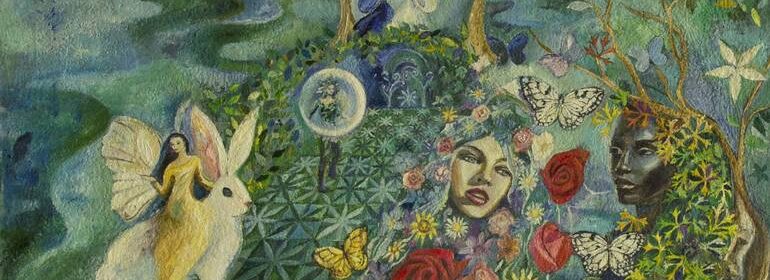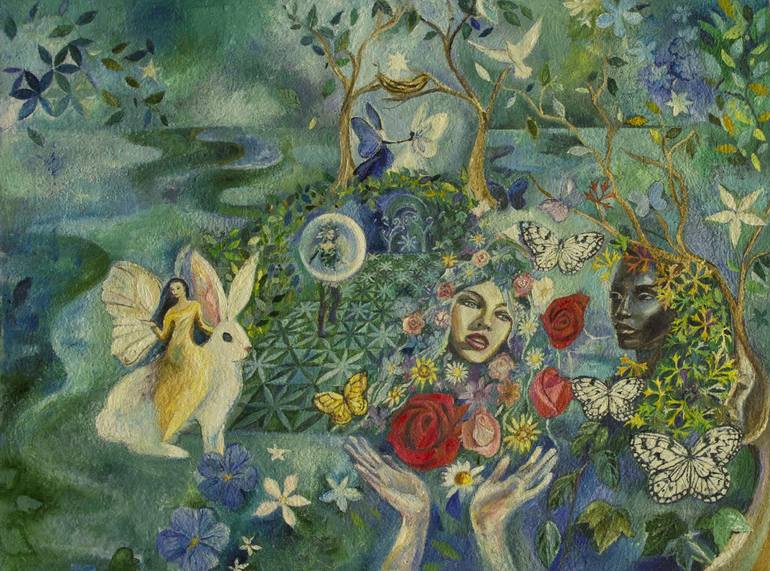Romeo and Juliet 3: Queen Mab Q & A

[Q4] How does Mercutio’s speech on Queen Mab contributes towards the illusion of life?

[A] Mercutio’s Queen Mab speech in “Romeo and Juliet” (Act 1, Scene 4) offers a rich exploration of illusion, particularly the illusory nature of life and human desires. His vivid, imaginative description of Queen Mab—a fairy who brings dreams to people—serves as a metaphor for the power of illusions and how dreams reflect the fantasies and aspirations of different individuals.
Dreams as Illusions
Mercutio vividly describes how Queen Mab shapes the dreams of different people based on their professions and desires: “lovers dream of love,” “lawyers dream of fees,” and “soldiers dream of cutting foreign throats” (Act 1, Scene 4). These lines highlight how dreams, often projections of our innermost desires, are illusory and fleeting. The dreams reflect what people want most but are merely fantastical, temporary creations that vanish upon waking. Shakespeare uses this to critique the nature of human aspiration, suggesting that these desires—whether love, wealth, or glory—are as insubstantial as dreams themselves. Just as Mercutio says, “dreamers often lie” (Act 1, Scene 4), the illusions people chase are elusive, highlighting how human desires may never materialize into reality.
Mockery of Romance and idealism
Mercutio’s speech also serves to mock Romeo’s romantic idealism. When Romeo speaks of a premonition of his fate, saying, “I fear too early, for my mind misgives / Some consequence yet hanging in the stars” (Act 1, Scene 4), Mercutio dismisses such thoughts with his fantastical portrayal of Queen Mab, reducing the importance of dreams and fate to whimsical, meaningless images. Mercutio’s cynical tone undercuts Romeo’s belief in romanticized love, portraying it as no more than an illusion. He compares Romeo’s ideals to the fleeting and insubstantial nature of dreams, emphasizing, “True, I talk of dreams, / Which are the children of an idle brain, / Begot of nothing but vain fantasy” (Act 1, Scene 4). Through this mockery, Mercutio suggests that Romeo’s dreams of love, like all dreams, are built on illusions that have little connection to reality.
Connection to Fate and Free Will
Mercutio’s speech also explores the tension between fate and free will, a central theme in the play. By illustrating how dreams reflect desires beyond individual control—whether it be soldiers dreaming of war or lovers dreaming of romance—Mercutio hints at the idea that life is similarly driven by forces outside of human will. He describes Queen Mab’s influence as arbitrary and beyond the dreamer’s control: “she gallops night by night / Through lovers’ brains, and then they dream of love” (Act 1, Scene 4). This imagery mirrors the larger theme in Romeo and Juliet, where the characters are often powerless against the greater forces of fate. Despite their desires, they cannot escape their tragic destiny, much like how dreamers cannot control the content of their dreams. Mercutio’s speech implies that life itself is shaped by forces beyond human control, much like the way dreams are shaped by Queen Mab’s influence.
Life’s Fleeting and Chaotic Nature
Mercutio’s rapid and chaotic description of Queen Mab—“Her wagon spokes made of long spinners’ legs, / The cover of the wings of grasshoppers” (Act 1, Scene 4)—highlights the frenetic, unpredictable nature of life. Mab’s quick passage through the dream world symbolizes the fleeting and uncontrollable aspects of life. Her “chariot drawn with a team of little atomies” and her “elf-locks” symbolize the small, intricate, yet chaotic details that govern life’s unpredictability. This imagery reflects how life, much like dreams, can seem chaotic and uncontrollable, driven by forces beyond comprehension or control. The speech’s chaotic energy mirrors the instability of the characters’ lives in the play, where love and violence erupt unexpectedly, leading to tragic consequences.
Illusions and Reality
Mercutio’s speech further critiques how human experiences, hopes, and dreams are often illusory. He describes how, under Queen Mab’s influence, dreams seem vivid and real, but they are ultimately “begot of nothing but vain fantasy” (Act 1, Scene 4). This line encapsulates the fleeting nature of both dreams and life’s desires. Shakespeare uses this to critique not just romantic love, but the broader human tendency to chase after ideals that are as insubstantial as dreams. Romeo’s idealized view of love, influenced by his dreams and desires, is shown to be fragile and temporary. Through Mercutio’s mocking tone and cynical view, Shakespeare underscores the illusory nature of human experience—how love, dreams, and desires are all fleeting and insubstantial, much like Queen Mab’s nightly influence on dreamers.
Critique of Human Desires and Aspirations
Shakespeare’s use of Mercutio’s speech suggests that much of human experience—love, ambition, or glory—is illusory. Mercutio’s description of Queen Mab’s nightly journey—“Over courtiers’ knees, that dream on curtsies straight” (Act 1, Scene 4)—shows how dreams, like human aspirations, reflect desires that are often superficial and driven by vanity. These desires, whether for love, wealth, or power, are shown to be fleeting and illusory. Mercutio’s mockery of the lovers, courtiers, and soldiers who dream of their idealized desires emphasizes how human life is similarly shaped by unattainable ideals, governed by forces beyond our control.
Conclusion
Mercutio’s Queen Mab speech in the Tragedy of Romeo and Juliet serves as a moment where Shakespeare critiques the illusionary aspects of life. By drawing attention to how dreams are shaped by fleeting, fantastical desires, Shakespeare highlights the broader theme of life’s unpredictability and chaos. Like the characters in Romeo and Juliet, who are driven by uncontrollable forces such as fate, humans are often guided by illusions and desires that rarely align with reality. Through Mercutio’s speech, Shakespeare conveys that much of life is a series of illusions, where desires, aspirations, and reality rarely align, and life itself is as fleeting and fragile as a dream.
For more Edexcel OL [IGCSE] Literature examination-type questions and answers, you may drop a message to Whatsapp +94 777100060. I am bunPeiris
